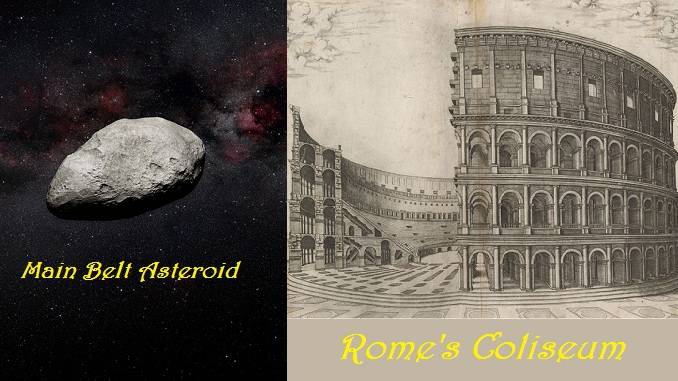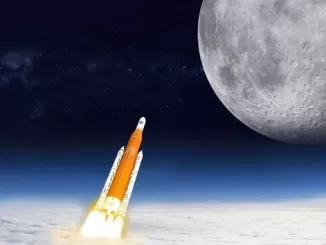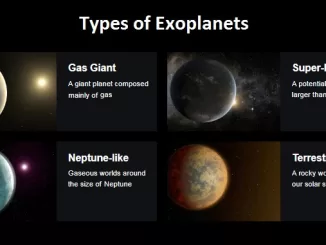
Webb Founds an Extremely Small Main Belt Asteroid that is Colosseum sized. An international team of European astronomers has detected an Extremely Small Main Belt Asteroid using NASA’s James Webb Space Telescope.
This Main Belt Asteroid, detected by Webb, is around the size of Rome’s Coliseum and measures between 100 to 200 meters (300 to 650 feet) in length.
The researcher’s team used data from the calibration of the MIRI, where they unintentionally detected the interloping asteroid by chance.
The object is possibly the smallest object ever observed by Webb and may be an example of an object measuring less than 1 km (0.6 miles) in length within the main asteroid belt, and is located between Mars and Jupiter. More observations are needed to better characterize this object’s nature and properties.
According to Thomas Müller, an astronomer at the Max Planck Institute for Extraterrestrial Physics in Germany, “The small asteroid is detected completely unexpectedly in publicly available MIRI calibration observations.” He said, “The measurements are some of the first MIRI measurements targeting the ecliptic plane and this work suggests that many new objects will be detected with this instrument.”
These Webb observations were published in the journal Astronomy and Astrophysics. These Webb observations were actually calibration images of the main belt asteroid (10920) 1998 BC1, which astronomers found in 1998, rather than designed to search for new asteroids.
The observations were made to test the performance of certain of MIRI’s filters, but the calibration team considered the observations to have failed for technical reasons because of the brightness of the object and an off-center telescope pointing. Despite this, the researchers used the information from asteroid 10920 to develop and test a new method for estimating an object’s size and constraining its orbit.
(Source – NASA)
Read More about NASA’s James Webb Space Telescope Images – JWST
First Images from the James Webb Space Telescope
Early ‘peas’ discovered behind the Galaxy Cluster SMACS 0723 by Webb
Dark Side of Pre-stellar Ice Chemistry revealed by NASA’s Webb Space
Young Stars in Early Stages of Formation Revealed by NASA Webb (Cosmic Cliffs NGC 3324)
Southern Ring Nebula is more complex than first appears – NASA’s Webb
Exoplanet Atmosphere as Never Seen Before revealed by NASA’s Webb
Fiery Hourglass captured by NASA’s Webb as New Star Forms ‘Protostar’
Dwarf galaxy Wolf–Lundmark–Melotte (WLM) captured by James Webb Space
Early Universe MACS0647-JD Galaxy James Webb Image
James Webb Space Telescope Pair of Colliding Galaxies Image
Amazing Star-Filled Portrait of Pillars of Creation by NASA’s Webb
NASA’s Webb Telescope finds that a Star Duo Forms Fingerprint in Space
NASA’s Hubble and Webb Telescope Team Up to Trace Interstellar Dust
IC 5332 Galaxy Image by MIRI James Webb Telescope NASA
James Webb telescope New Image Neptune Rings
Red Planet Mars Images by JWST of NASA
NASA’s JWST has captured an image of Cosmic Tarantula
NASA Phantom Galaxy James Webb Space Telescope Image M74
NASA JWST Images Turned Into Sound Music
NASA Webb Space Telescope found Carbon Dioxide in Exoplanet Atmosphere
NASA JWST Jupiter Images Showcase Auroras, Hazes
NASA James Webb Space Telescope Jupiter Images Auroras, Hazes
NASA’s JWST has released crystal-clear images of Jupiter and its moons
JWST has released new images of Cartwheel Galaxy
Deepest Infrared Image of Universe from NASA’s James Webb Space
Copyrighted Material © 2019 - 2024 Prinsli.com - All rights reserved
All content on this website is copyrighted. It is prohibited to copy, publish or distribute the content and images of this website through any website, book, newspaper, software, videos, YouTube Channel or any other medium without written permission. You are not authorized to alter, obscure or remove any proprietary information, copyright or logo from this Website in any way. If any of these rules are violated, it will be strongly protested and legal action will be taken.





Be the first to comment